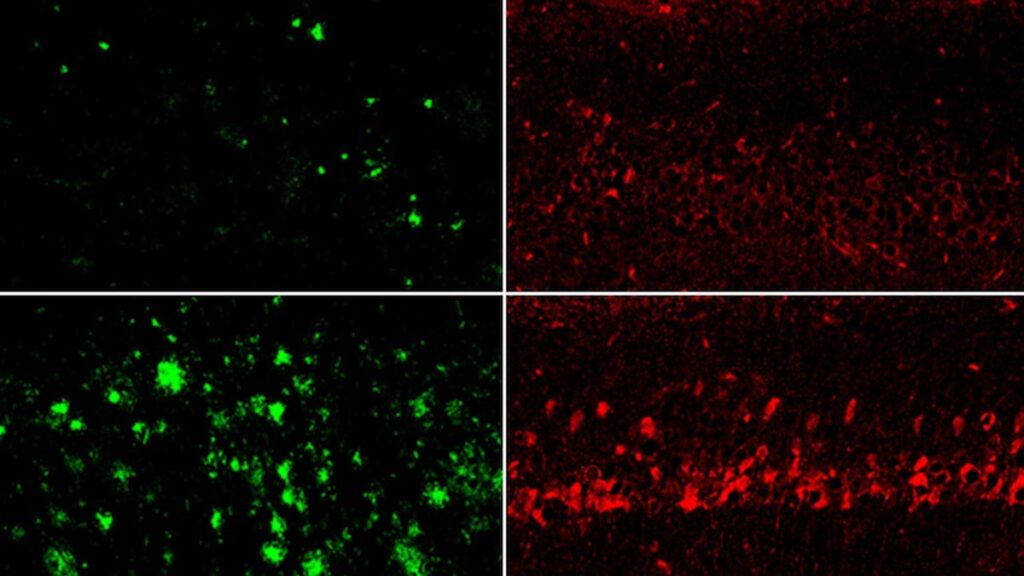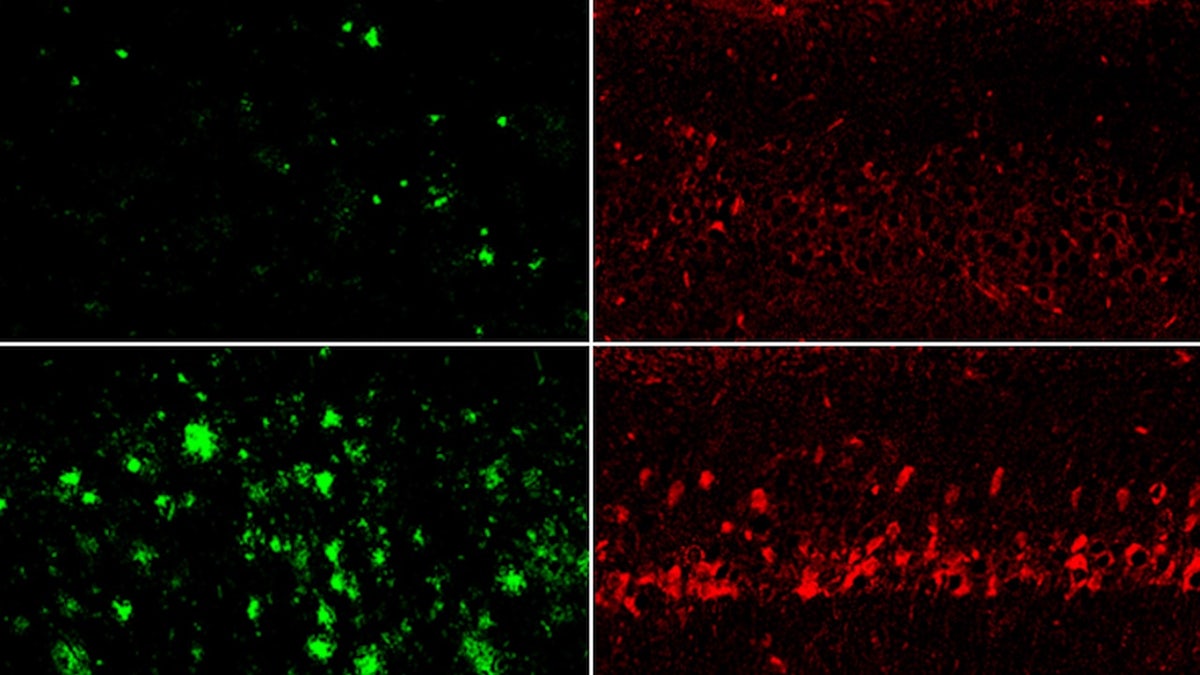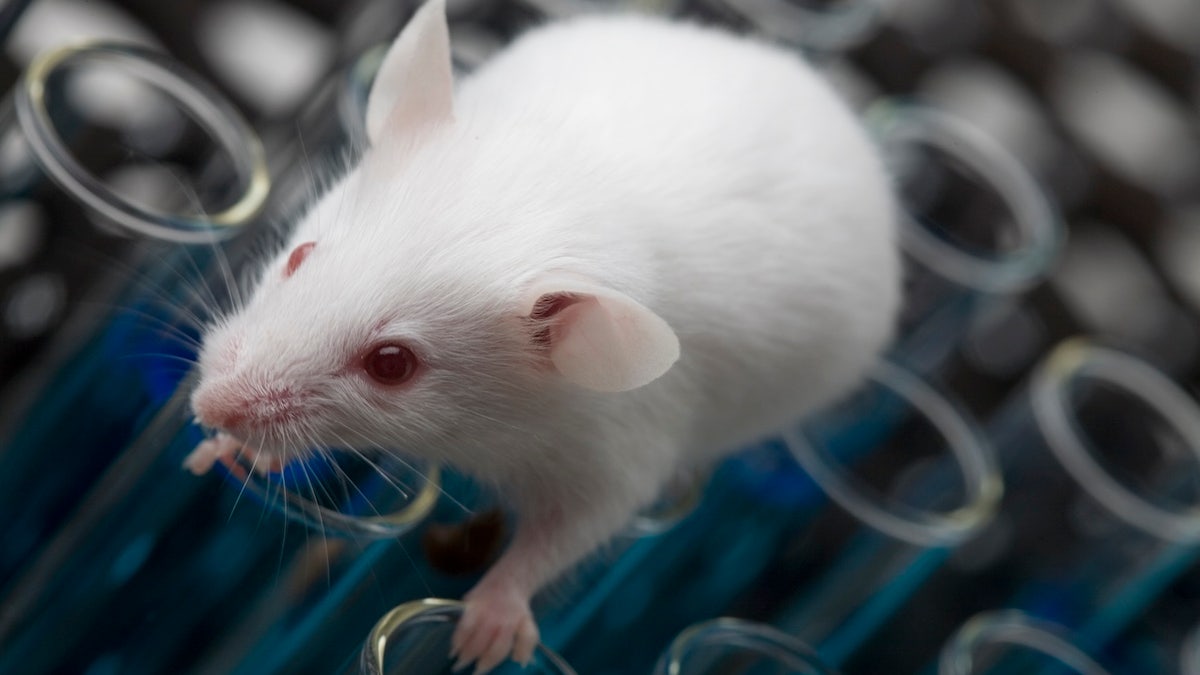
NEWYou can now listen to Fox News articles!
Researchers have uncovered a new factor that could contribute to Alzheimer’s disease development.
A study by Harvard Medical School has identified low lithium levels in the brain as a possible trigger for the common dementia.
Lithium is known to have many functions in the brain, including balancing mood-regulating chemicals, protecting neurons and managing emotional processing. It has also been used to treat bipolar disorder and depression.
ALZHEIMER’S RESEARCHERS SAY TARGETING BRAIN SUGAR COULD HELP PROTECT AGAINST DEMENTIA
Now, new findings show that the metal could be a “missing link” in Alzheimer’s risk, according to a Harvard press release.
The researchers tested lithium’s effects in mice, as well as human brain tissue and blood samples.

In a mouse model of Alzheimer’s disease, lithium deficiency, right, dramatically increased amyloid beta deposits in the brain compared with mice that had normal physiological levels of lithium, left. Bottom row: The same was true for the Alzheimer’s neurofibrillary tangle protein tau. (Yankner Lab)
The human brain samples were obtained in partnership with the Rush Memory and Aging Project in Chicago, which maintains post-mortem brain tissue from thousands of donors.
The samples represented the full spectrum of cognitive health, ranging from no sign of disease to mild cognitive impairment to advanced Alzheimer’s, the release stated.
TWO CANCER DRUGS SHOW PROMISE IN REVERSING ALZHEIMER’S DEVASTATING EFFECTS
They discovered that lithium levels became lower as signs of the disease increased, showing as “greatly diminished” in advanced Alzheimer’s patients.
“It’s the first time anyone’s shown that lithium exists at a natural level that’s biologically meaningful without giving it as a drug.”
As toxic amyloid plaques build up in the brain — a hallmark of Alzheimer’s — they begin to attach to lithium, keeping it from performing its protective functions.
When the mice were fed a “lithium-restricted diet,” their brains’ lithium levels decreased, causing accelerated aging, formation of amyloid-beta plaques, greater inflammation, memory loss and cognitive decline.

Lithium deficiency thinned the myelin that coats neurons, right, compared to normal mice. (Yankner Lab)
“Lithium turns out to be like other nutrients we get from the environment, such as iron and vitamin C,” said senior author Bruce Yankner, professor of genetics and neurology in the Blavatnik Institute at Harvard Medical School, in the release.
“It’s the first time anyone’s shown that lithium exists at a natural level that’s biologically meaningful without giving it as a drug.”
ALZHEIMER’S RISK COULD RISE WITH SPECIFIC SLEEP PATTERN, EXPERTS WARN
The researchers also discovered a new type of lithium compound — lithium orotate — that did not bind to amyloid. When mice drank water containing this compound, it helped to restore memory and reverse brain damage, even for those who had advanced signs of disease.
The findings were published in the journal Nature.

The brain tissue samples represented the full spectrum of cognitive health, ranging from no sign of disease to mild cognitive impairment to advanced Alzheimer’s disease. (iStock)
“What impresses me the most about lithium is the widespread effect it has on the various manifestations of Alzheimer’s,” said Yanker. “I really have not seen anything quite like it in all my years of working on this disease.”
“The idea that lithium deficiency could be a cause of Alzheimer’s disease is new and suggests a different therapeutic approach.”
Potential limitations
While the study did suggest that the amount of lithium in the brain could be related to amyloid beta buildup, it did have some obvious limitations, according to Ozama Ismail, Ph.D., director of scientific programs for the Alzheimer’s Association in Chicago.

While studies in mouse models are a “vital early step” in therapeutic research, the lead study author emphasized that much more research is needed to understand the health effects of lithium levels in the brain. (iStock)
“Animal models do not directly replicate Alzheimer’s in humans; rather, they can provide some insights into the biology of disease progression and development,” Ismail, who was not involved in the study, told Fox News Digital.
“The mouse models have been modified to accumulate amyloid beta, a hallmark protein that builds up in the brains of people with Alzheimer’s.”
CLICK HERE TO GET THE FOX NEWS APP
While studies in mouse models are a “vital early step” in therapeutic research, Ismail emphasized that much more research is needed to understand the health effects of lithium levels in the brain.
“Understanding if lithium can be therapeutic for Alzheimer’s requires large clinical trials in representative populations,” he said.

If future studies confirm these findings, the scientists say that routine blood tests could potentially screen for lithium levels and identify people at risk. (iStock)
Much like other major diseases, it is likely that Alzheimer’s treatment will require multiple approaches combining medication and lifestyle changes, Ismail predicted.
The researchers agreed that more research in human clinical trials is needed.
CLICK HERE TO SIGN UP FOR OUR HEALTH NEWSLETTER
“You have to be careful about extrapolating from mouse models, and you never know until you try it in a controlled human clinical trial,” Yankner noted. “But so far, the results are very encouraging.”
If future studies confirm these findings, the scientists say that routine blood tests could potentially screen for lithium levels and identify people at risk.
“My hope is that lithium will do something more fundamental than anti-amyloid or anti-tau therapies.”
In the meantime, Yankner cautioned against people taking lithium compounds “on their own.”
“My hope is that lithium will do something more fundamental than anti-amyloid or anti-tau therapies, not just lessening but reversing cognitive decline and improving patients’ lives,” he said.
For more health articles, visit www.foxnews.com/health
The study was supported by the National Institutes of Health, the Ludwig Family Foundation, the Glenn Foundation for Medical Research and the Aging Mind Foundation.
 Latest World Breaking News Online News Portal
Latest World Breaking News Online News Portal






